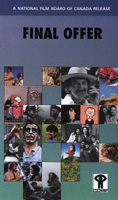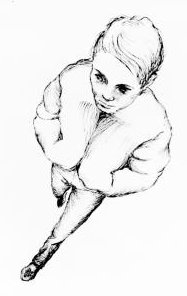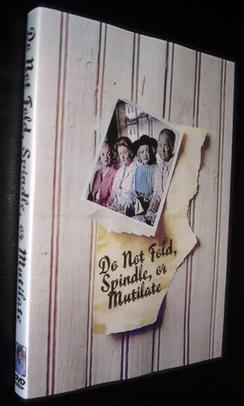Related Research Articles

The National Film Board of Canada is Canada's public film and digital media producer and distributor. An agency of the Government of Canada, the NFB produces and distributes documentary films, animation, web documentaries, and alternative dramas. In total, the NFB has produced over 13,000 productions since its inception, which have won over 5,000 awards. The NFB reports to the Parliament of Canada through the Minister of Canadian Heritage. It has bilingual production programs and branches in English and French, including multicultural-related documentaries.
The 1st Genie Awards were presented on March 20, 1980, and honoured films released in 1979.
Every Child is an animated short film produced in 1979 by the National Film Board of Canada in association with UNICEF.

Final Offer is a Canadian film documenting the 1984 contract negotiations between the United Auto Workers Union (UAW) and General Motors. Ultimately, it provided a historical record of the birth of the Canadian Auto Workers Union (CAW) as Bob White, the head of the Canadian sector of the UAW, led his membership out of the international union and created the CAW.

Walking is a 1968 Canadian animated short film directed and produced by Ryan Larkin for the National Film Board of Canada, composed of animated vignettes of how different people walk.

Do Not Fold, Spindle or Mutilate is a 1971 American made-for-television mystery film directed by Ted Post, starring Myrna Loy, Helen Hayes, Mildred Natwick, Sylvia Sidney, John Beradino and Vince Edwards, with the screenplay adapted by John D. F. Black from a novel of the same name by Doris Miles Disney. It was broadcast as the ABC Movie of the Week on November 9, 1971.
The Best Damn Fiddler from Calabogie to Kaladar is a 1968 National Film Board of Canada drama directed by Peter Pearson, produced by John Kemeny and written by Joan Finnigan. The 49-minute drama stars Chris Wiggins and Kate Reid, along with Margot Kidder in her first feature role.

Blake is a 1969 Canadian short documentary film produced by the National Film Board of Canada (NFB). The film was directed by Bill Mason, and his fellow filmmaker Blake James, who pilots his own aircraft and lives by a unique code. Blake is Mason's cinematic testimonial to his friend and his "hobo of the skies" lifestyle.
John Spotton C.S.C. was a Canadian filmmaker with the National Film Board of Canada.
John Kemeny was a Hungarian-Canadian film producer whom the Toronto Star called "the forgotten giant of Canadian film history and...the most successful producer in Canadian history." His production credits include The Apprenticeship of Duddy Kravitz, Atlantic City, and Quest for Fire.
The 28th Canadian Film Awards were held on November 20, 1977 to honour achievements in Canadian film. The ceremony was hosted by actor Gordon Pinsent.
Bravery in the Field is a 1979 Canadian short drama film, produced by the National Film Board of Canada and directed by Giles Walker.
The 20th Canadian Film Awards were held on October 4, 1968 to honour achievements in Canadian film. The ceremony was hosted by broadcaster Bill Walker and actress Louise Marleau.
Grierson is a 1973 documentary directed by Roger Blais for the National Film Board of Canada (NFB). It won, among other awards, the 1974 BAFTA Award for Best Documentary.
The Bronswik Affair is a 1978 Canadian short film, directed by Robert Awad and André Leduc for the National Film Board of Canada.
Who Will Teach Your Child? is a 1948 Canadian short documentary, directed by Stanley Jackson for the National Film Board of Canada.
The 8th Canadian Film Awards were held on August 6, 1956 to honour achievements in Canadian film. The ceremony was hosted by actor Maurice Evans.
The 6th Canadian Film Awards were presented on May 10, 1954 to honour achievements in Canadian film.
The 3rd Canadian Film Awards were presented on April 22, 1951, to honour achievements in Canadian film. The ceremony was hosted by Mary Pickford.
John Howe was a Canadian director, producer, and composer with the National Film Board of Canada. He is best known for his films Do Not Fold, Staple, Spindle or Mutilate and Why Rock the Boat?, and for his handling of the NFB’s 1969 Austerity Crisis.
References
- ↑ Evans 1991, p. 153.
- ↑ Gary Evans, In the National Interest: A Chronicle of the National Film Board of Canada from 1949 to 1989. University of Toronto Press, 1991. ISBN 9780802068330. p. 153.
- ↑ "Do not fold, staple, spindle, or mutilate". acmi.net.au. ACMI. Retrieved 20 April 2023.
- ↑ Lubar, Steven. ""Do Not Fold, Spindle or Mutilate": A Cultural History of the Punch Card". repository.library.brown.edu. Brown University. Retrieved 20 April 2023.
- ↑ "Do Not Fold, Staple, Spindle or Mutilate". davebrubeckjazz.com. Dave Brubeck Jazz. Retrieved 20 April 2023.
- ↑ Maria Topalovich, And the Genie Goes To...: Celebrating 50 Years of the Canadian Film Awards. Stoddart Publishing, 2000. ISBN 0-7737-3238-1. pp. 81-83.
- ↑ "Do Not Fold, Staple or Mutilate". onf-nfb.gc.ca. National Film Board of Canada. Retrieved 5 February 2023.